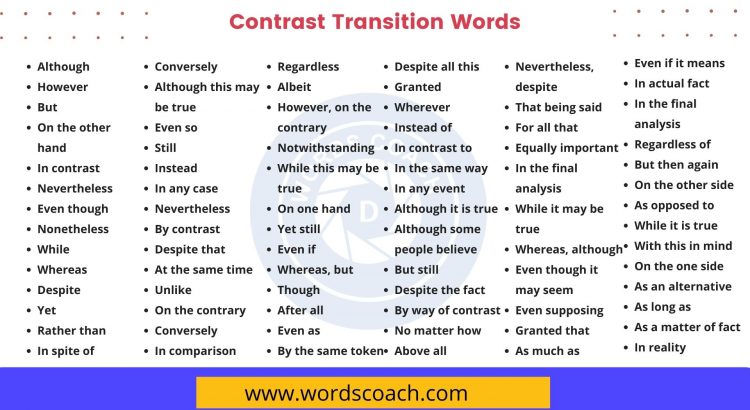Contrast Transition Words
What are contrast transition words?
Contrast transition words are words or phrases that are used to signal a contrast or difference between two ideas, concepts, or pieces of information. They help to show the relationship between two things, and to make your writing or speech more coherent and clear.
Using contrast transition words helps you to emphasize the differences between two ideas, as well as to make clear which one you believe to be more valid or relevant. Examples of contrast transition words include “however,” “but,” “on the other hand,” “in contrast,” “nevertheless,” “yet,” “although,” “conversely,” and “despite.”
By using contrast transition words, you can make your writing or speech more organized and effective, and help your reader or listener to understand your ideas and arguments more easily.
Contrast transition words are used to show differences between two ideas, concepts, or objects. Here are some examples of contrast transition words along with their meanings and usage:
Although – introduces a contrasting idea that is different from the previous statement.
Example: Although it was cold, he went outside without a jacket.
But – introduces a contrasting idea or statement.
Example: I wanted to go out, but it was raining heavily.
On the other hand – introduces a contrasting idea that is different from the previous statement.
Example: The weather is beautiful, but on the other hand, I have a lot of work to do.
Whereas – introduces a contrasting idea that is different from the previous statement.
Example: Whereas some people enjoy reading, others prefer watching movies.
Despite – introduces a contrasting idea that goes against the previous statement.
Example: Despite being tired, she managed to finish the project.
However – introduces a contrasting idea that contrasts with the previous statement.
Example: She loves swimming; however, she is afraid of deep waters.
In contrast – introduces a contrasting idea that is the opposite of the previous statement.
Example: I love summer. In contrast, my brother loves winter.
Even though – introduces a contrasting idea that is contradictory to the previous statement.
Example: Even though the book was boring, I couldn’t stop reading it.
While – introduces a contrasting idea that is happening simultaneously.
Example: While some people like spicy food, others can’t handle it.
Nonetheless – introduces a contrasting idea that goes against the previous statement.
Example: The project was challenging; nonetheless, we managed to complete it on time.
Rather than – introduces a contrasting idea that is different from the previous statement.
Example: Rather than go out, he decided to stay at home and read.
In spite of – introduces a contrasting idea that goes against the previous statement.
Example: In spite of the rain, we still decided to have a picnic.
Yet – introduces a contrasting idea or statement.
Example: The movie was boring, yet it was well-directed.
Although this may be true – introduces a contrasting idea that is different from the previous statement.
Example: Although this may be true for some, it is not true for everyone.
Conversely – introduces a contrasting idea that is the opposite of the previous statement.
Example: She enjoys staying up late; conversely, I prefer to go to bed early.
Nonetheless – introduces a contrasting idea that goes against the previous statement.
Example: He is not very athletic; nonetheless, he enjoys playing sports.
In any case – introduces a contrasting idea that is different from the previous statement.
Example: In any case, we should still try to finish the project on time.
Despite the fact that – introduces a contrasting idea that goes against the previous statement.
Example: Despite the fact that it was her first time, she performed the dance perfectly.
Even so – introduces a contrasting idea that is contradictory to the previous statement.
Example: The food was not great; even so, the service was excellent.
In comparison – introduces a contrasting idea that is different from the previous statement.
Example: In comparison to last year, our sales have increased significantly.
By contrast – introduces a contrasting idea that is the opposite of the previous statement.
Example: The beach was crowded. By contrast, the park was empty.
Despite that – introduces a contrasting idea that goes against the previous statement.
Example: She doesn’t like to exercise; despite that, she is in great shape.
Nonetheless – introduces a contrasting idea that goes against the previous statement.
Example: The traffic was terrible; nonetheless, we arrived on time.
Unlike – introduces a contrasting idea that is different from the previous statement.
Example: She was unlike him in every way except for her coal black eyes.
Nevertheless – introduces a contrasting idea that goes against the previous statement.
Example: The movie was boring. Nevertheless, it was well-directed.
These are some of the most common contrast transition words with examples of how to use them in a sentence.

List of 100+ Useful Contrast Transition Words
Here is a list of contrast transition words that can be used to show a contrast between two ideas, phrases or clauses:
| Although | However |
| But | On the other hand |
| In contrast | Nevertheless |
| Even though | Nonetheless |
| While | Whereas |
| Despite | Yet |
| Rather than | In spite of |
| Conversely | Although this may be true |
| Even so | Still |
| Instead | In any case |
| Nevertheless | By contrast |
| Despite that | At the same time |
| Unlike | On the contrary |
| Conversely | In comparison |
| Regardless | Albeit |
| However, on the contrary | Notwithstanding |
| While this may be true | On one hand |
| Yet still | Even if |
| Whereas, but | Though |
| After all | Even as |
| By the same token | Despite all this |
| Granted | Wherever |
| Instead of | In contrast to |
| In the same way | In any event |
| Although it is true | Although some people believe |
| But still | Despite the fact |
| By way of contrast | No matter how |
| Nevertheless, despite | That being said |
| For all that | Equally important |
| In the final analysis | Above all |
| While it may be true | Whereas, although |
| Even though it may seem | Even supposing |
| Granted that | Although it may seem |
| Even if it means | In actual fact |
| In the final analysis | Regardless of |
| But then again | On the other side |
| As opposed to | As much as |
| While it is true | With this in mind |
| On the one side | As an alternative |
| As long as | As a matter of fact |
| In reality | In either case |
| In the meantime | In the light of |
| In the meantime | In the final analysis |
| More than that | On the contrary |
| In order to | In short |
| In the long run | In the meantime |
| In the light of this | In this respect |
| All the same | At the same time |
| Notwithstanding this | Even though this may be true |
| Even supposing that | In the meantime. |
These are some of the most common contrast transition words.

FAQ’s
What are contrast transition words?
Contrast transition words are words or phrases that signal a contrast or difference between two ideas, concepts, or pieces of information. They help to show the relationship between two things, and to make your writing more coherent and clear.
Why are contrast transition words important?
Contrast transition words are important because they help to create coherence and clarity in your writing. By using these words, you can show the relationship between different ideas or pieces of information, and make it easier for your reader to understand your point of view.
What are some common contrast transition words?
Some common contrast transition words include “however,” “but,” “on the other hand,” “in contrast,” “nevertheless,” “yet,” “although,” “conversely,” and “despite.”
When should I use contrast transition words?
You should use contrast transition words whenever you want to show a contrast or difference between two ideas or pieces of information. This can be useful in many different types of writing, including essays, research papers, and business reports.
Can I use contrast transition words in spoken English as well as in writing?
Yes, you can use contrast transition words in spoken English as well as in writing. In fact, using these words can be especially helpful in conversations and debates, where you need to clearly express your opinions and ideas.









